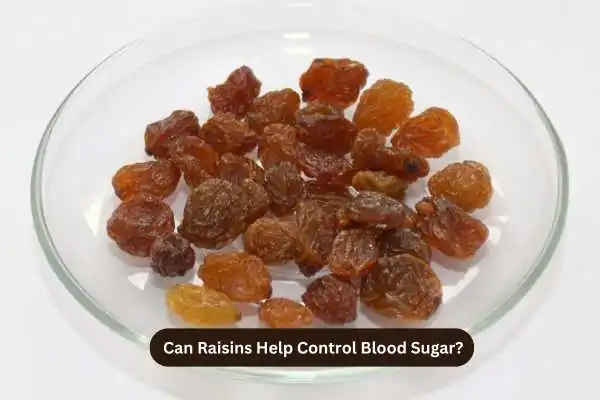Raisins are often seen as a naturally sweet and convenient snack. But for those concerned about blood sugar levels—especially people living with diabetes or prediabetes in the UK—the question arises: can raisins help control blood sugar, or do they cause harmful spikes? The answer is more nuanced than a simple yes or no.
In this article, we take an in-depth look at how raisins impact blood glucose, whether they can be part of a healthy diet for blood sugar management, and how to consume them wisely.

What Are Raisins?
Raisins are dried grapes, typically produced from seedless varieties like Thompson or Sultana grapes. As grapes dry, their natural sugars become concentrated, giving raisins their distinctive sweet taste and chewy texture.
They’re rich in several nutrients, including:
-
Dietary fibre
-
Potassium
-
Iron
-
Antioxidants like polyphenols
Due to their nutrient profile, raisins are considered a healthier alternative to processed sweets. But their sugar content raises concerns for individuals monitoring their blood glucose.
Raisins and Blood Sugar: The Basics
Natural Sugar Content
Raisins are high in natural sugars—primarily fructose and glucose. A 30g serving (roughly a small handful) contains around 18–24g of sugar. This can seem high, especially when compared to fresh fruit. However, it’s important to look beyond sugar content alone.
Glycaemic Index (GI)
The glycaemic index measures how quickly a food raises blood sugar levels. Foods with a GI below 55 are considered low GI and are digested slowly, causing a gradual rise in blood sugar.
Raisins have a moderate GI—typically around 49 to 64, depending on the variety and serving size. This means they may raise blood glucose moderately but not as rapidly as high-GI foods like white bread or sugary drinks.
Glycaemic Load (GL)
Another useful measure is glycaemic load, which factors in both the GI and the carbohydrate content of a standard serving. Raisins have a low to moderate glycaemic load per small portion, meaning they may be suitable in controlled amounts.
Scientific Studies on Raisins and Blood Sugar
Several research studies have examined the effect of raisins on blood sugar:
-
A 2015 study published in the Journal of Nutritional Science found that participants who consumed raisins as a snack experienced significantly lower post-meal blood glucose compared to those who ate processed snacks like crackers.
-
Another randomised clinical trial observed that people with type 2 diabetes who ate raisins three times a day showed reduced HbA1c levels over time—an important marker of long-term blood sugar control.
These findings suggest that raisins, when eaten in moderation, may support stable blood sugar, especially when used as a substitute for ultra-processed snacks.
Benefits of Raisins for Blood Sugar Control
1. Fibre Content
Raisins are a source of soluble fibre, which slows digestion and sugar absorption. This can lead to a more stable rise in blood sugar rather than a rapid spike.
2. Natural Source of Antioxidants
Raisins contain polyphenols, which may improve insulin sensitivity and reduce inflammation—both of which play roles in blood sugar regulation.
3. Convenient Whole Food Snack
Unlike sweets or processed snacks, raisins are a single-ingredient whole food. This makes them a better choice for individuals trying to limit added sugars and artificial ingredients.
How to Eat Raisins for Blood Sugar Management
Portion control is key. While raisins can fit into a balanced diet, consuming them in excess can cause blood sugar spikes due to their concentrated sugar content.
Tips for Enjoying Raisins Wisely:
-
Stick to small portions: Aim for 1 to 2 tablespoons (about 15–30g) at a time.
-
Pair with protein or fat: Combine with nuts or Greek yoghurt to slow sugar absorption.
-
Use as a natural sweetener: Add a few raisins to porridge or salads instead of sugary dressings.
-
Avoid added sugar versions: Choose unsweetened, organic raisins when possible.
Who Should Be Cautious?
People with poorly controlled diabetes or insulin resistance should be cautious and consult their healthcare provider before adding dried fruits to their diet. While raisins offer health benefits, their sugar concentration means they must be consumed mindfully.
Raisins vs Other Snacks
When compared to typical snack foods available in UK supermarkets—like crisps, biscuits, or chocolate bars—raisins offer a healthier, more natural alternative. They provide energy along with fibre, minerals, and antioxidants, whereas many packaged snacks contain refined sugar, trans fats, and additives.
Replacing refined snacks with raisins, in moderation, can be a small but positive step toward better blood sugar management.
Final Thoughts
Raisins can be part of a healthy diet for managing blood sugar, especially when consumed in small portions and paired with other nutrient-dense foods. Their moderate glycaemic index, fibre content, and antioxidant profile make them a smarter choice than many processed snack options.
However, like all foods high in natural sugars, moderation is essential. For individuals in the UK aiming to control or stabilise blood glucose levels, raisins can offer a sweet, nutritious solution when incorporated thoughtfully into daily meals.
As with any dietary change, it’s wise to monitor your blood sugar response and speak with a healthcare provider or dietitian, particularly if you have diabetes or metabolic conditions.

